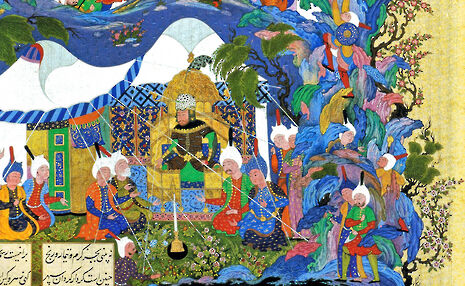Review: Pembroke’s Shahnameh Centre for Persian Studies
Gabrielle Watts details an exciting opening remembering a not-so-forgotten ancient civilisation

“Being originally from Russia, working on this project with the British, I realise we are sort of the worst possible candidates from the Iranian point of view to organise the preservation of Persian culture.” Dr Firuza Abdullaeva gives a self-deprecating smile to a chorus of knowing chuckles. As Head of Pembroke College’s Shahnameh Centre for Persian Studies, inaugurated this Saturday, Dr Abdullaeva has every reason to smile. The Shahnameh Centre is the culmination of a project founded by Professor Charles Melville in 1999, and despite the superfluous ghosts of old wrongs, any misgivings could be formed only in error. In their passion, neither Melville nor Abdullaeva could be doubted (the latter named at least three paintings from the ‘Time Forward’ exhibition as her favourites, and may well have elucidated more had she had time). Both are giants in their field, and continue the impressive tradition of research into Persian culture which has existed in Pembroke since at least the 1880s, and which has included such eminent individuals as Professors E. G. Brown and A. J. Arberry.
The project was made possible by the generous support of Ms Bita Daryabari. Daryabari made her fortune as a pioneer in the field of telecommunications, and is now a renowned philanthropist with an impressive resume of achievements in that field. In an eloquent speech, Ms Daryabari, said that “it is through the prism of Persian poetry and art that we can give the world a more amiable view of Persian culture.” Later, she explained that she has funded this project in order to both preserve Persian culture for later generations and to encourage the efforts of significant academics like Professor Melville.
The speakers invited to the opening were Dr Olga Davidson, Professor Touraj Daryaee, and Dr Sussan Babaie. All three are currently based in America, and specialise respectively in literature, history, and Islamic art. The range of subjects on which they spoke reflects the project’s encouragement of an interdisciplinary approach towards Persian culture. Dr Babaie considers it an important success, and one that will be invaluable for presenting a better rounded, more realistic view of Persian literature, art, and history. She went on to note that these studies are neither ethnographic nor nationalistic: they concern a culture that spanned from the western Mediterranean to the borders of China. The sheer breadth is breath-taking, and should prove to be a vital resource not only for Pembroke College, but the Department of Asian and Middle Eastern Studies, and scholars on a global scale.
In conclusion, a word ought to be said on the text after which the centre has been named. The Shahnama, or Book of Kings, is a famous epic poem by the eleventh century author Firdausi. One element of the centre’s many undertakings has been to digitise hundreds of manuscripts containing the text from the fourteenth to the nineteenth centuries, and the sheer quantity of output inspired by the epic speaks volumes of its influence. It has often been referred to as the encyclopaedia of Persian culture, and continues to be of singular relevance: whether in the 2009 elections or in contemporary art. Artists who have drawn on the rich textual tradition for their work include Cambridge locals Sama Soltani and Veronica Shimanovskaya. These and others were exhibited in the ‘Time Forward’ exhibition following the centre’s inauguration. Alongside them were displayed manuscripts and artefacts on loan from various eminent collections. The juxtaposition of old and new in Pembroke’s Nihon Room illustrated Dr Abdullaeva’s conclusion perfectly: that this centre is not, in fact, the beginning of something new, it is the continuation of a very old tradition, which demands both study and preservation.
In the words of Firdausi himself:
‘I shall not die, these seeds I’ve sown will save
My name and reputation from the grave
And men of sense and wisdom will proclaim,
When I have gone, my praises and my fame.’
~Abu’l-Qasim Firdause, transl. by Dick Davis
As far as Pembroke college is concerned, this thousand year old name will not be lost to the sands of time.
Pembroke College’s new centre for Persian Studies opened on 24 May 2014. The centre is located at 1 Fitzwilliam Street, and it is possible to access the Shahnameh database online at http://shahnama.caret.cam.ac.uk.
 News / Cambridge study finds students learn better with notes than AI13 December 2025
News / Cambridge study finds students learn better with notes than AI13 December 2025 News / Cambridge Vet School gets lifeline year to stay accredited28 November 2025
News / Cambridge Vet School gets lifeline year to stay accredited28 November 2025 Science / Did your ex trip on King’s Parade? The science behind the ‘ick’12 December 2025
Science / Did your ex trip on King’s Parade? The science behind the ‘ick’12 December 2025 News / Uni Scout and Guide Club affirms trans inclusion 12 December 2025
News / Uni Scout and Guide Club affirms trans inclusion 12 December 2025 Arts / Modern Modernist Centenary: T. S. Eliot13 December 2025
Arts / Modern Modernist Centenary: T. S. Eliot13 December 2025







